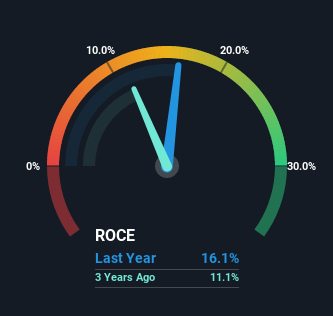- United States
- /
- Entertainment
- /
- NasdaqGS:WMG
Warner Music Group (NASDAQ:WMG) Is Experiencing Growth In Returns On Capital

What are the early trends we should look for to identify a stock that could multiply in value over the long term? In a perfect world, we'd like to see a company investing more capital into its business and ideally the returns earned from that capital are also increasing. Basically this means that a company has profitable initiatives that it can continue to reinvest in, which is a trait of a compounding machine. So on that note, Warner Music Group (NASDAQ:WMG) looks quite promising in regards to its trends of return on capital.
What Is Return On Capital Employed (ROCE)?
For those who don't know, ROCE is a measure of a company's yearly pre-tax profit (its return), relative to the capital employed in the business. The formula for this calculation on Warner Music Group is:
Return on Capital Employed = Earnings Before Interest and Tax (EBIT) ÷ (Total Assets - Current Liabilities)
0.16 = US$717m ÷ (US$7.8b - US$3.4b) (Based on the trailing twelve months to September 2022).
Thus, Warner Music Group has an ROCE of 16%. On its own, that's a standard return, however it's much better than the 8.4% generated by the Entertainment industry.
View our latest analysis for Warner Music Group

In the above chart we have measured Warner Music Group's prior ROCE against its prior performance, but the future is arguably more important. If you'd like, you can check out the forecasts from the analysts covering Warner Music Group here for free.
What The Trend Of ROCE Can Tell Us
Warner Music Group is displaying some positive trends. The data shows that returns on capital have increased substantially over the last five years to 16%. Basically the business is earning more per dollar of capital invested and in addition to that, 23% more capital is being employed now too. This can indicate that there's plenty of opportunities to invest capital internally and at ever higher rates, a combination that's common among multi-baggers.
Another thing to note, Warner Music Group has a high ratio of current liabilities to total assets of 43%. This can bring about some risks because the company is basically operating with a rather large reliance on its suppliers or other sorts of short-term creditors. While it's not necessarily a bad thing, it can be beneficial if this ratio is lower.
Our Take On Warner Music Group's ROCE
A company that is growing its returns on capital and can consistently reinvest in itself is a highly sought after trait, and that's what Warner Music Group has. Astute investors may have an opportunity here because the stock has declined 18% in the last year. That being the case, research into the company's current valuation metrics and future prospects seems fitting.
If you want to know some of the risks facing Warner Music Group we've found 3 warning signs (1 is concerning!) that you should be aware of before investing here.
While Warner Music Group may not currently earn the highest returns, we've compiled a list of companies that currently earn more than 25% return on equity. Check out this free list here.
Valuation is complex, but we're here to simplify it.
Discover if Warner Music Group might be undervalued or overvalued with our detailed analysis, featuring fair value estimates, potential risks, dividends, insider trades, and its financial condition.
Access Free AnalysisHave feedback on this article? Concerned about the content? Get in touch with us directly. Alternatively, email editorial-team (at) simplywallst.com.
This article by Simply Wall St is general in nature. We provide commentary based on historical data and analyst forecasts only using an unbiased methodology and our articles are not intended to be financial advice. It does not constitute a recommendation to buy or sell any stock, and does not take account of your objectives, or your financial situation. We aim to bring you long-term focused analysis driven by fundamental data. Note that our analysis may not factor in the latest price-sensitive company announcements or qualitative material. Simply Wall St has no position in any stocks mentioned.
About NasdaqGS:WMG
Warner Music Group
Operates as a music entertainment company in the United States, the United Kingdom, Germany, and internationally.
Moderate growth potential with mediocre balance sheet.
Market Insights
Community Narratives



